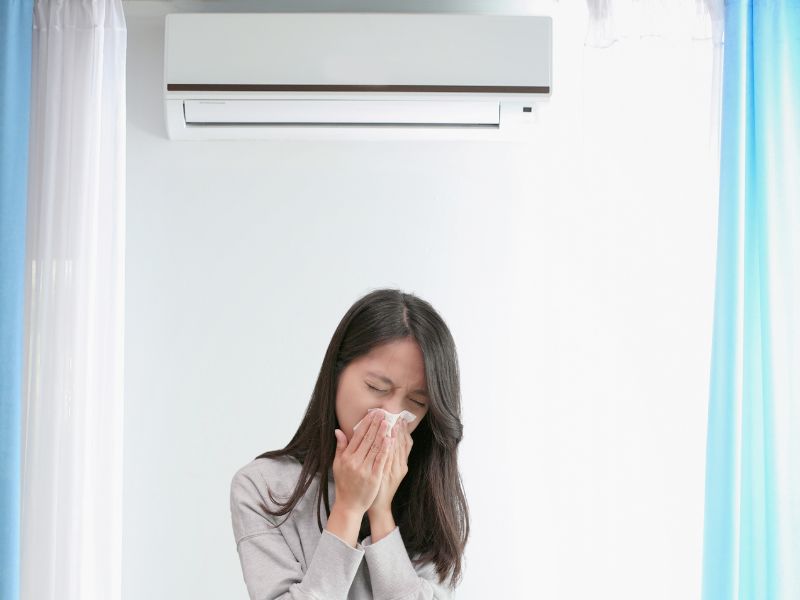Summer is a great time for barbecues, pool parties, and soaking up the sun. But for many of us, this season comes with an unwanted side effect – air conditioner cough. The dry, hacking cough that often accompanies prolonged air conditioning use can be not only disruptive to your daily life but also a sign of a more serious underlying condition. If you’re looking for ways to relieve your air conditioner cough and restore your breathing to normal, this article will guide you through the causes, symptoms, and proven remedies for this condition. So, sit back, relax, and read on to discover everything you need to know about getting rid of air conditioner cough.
Tabe of Contents
- 1. Understanding the Causes of Air Conditioner Cough: The link between AC systems and respiratory issues
- 2. Improving Indoor Air Quality: Tips for maintaining clean and healthy air in your home
- 3. Efficiently Operating Your AC Unit: How to maintain your AC system to prevent respiratory irritants
- 4. Alternative Cooling Techniques: Exploring natural and eco-friendly cooling methods to reduce reliance on AC units
- 5. Seeking Medical Advice: When to see a doctor for persistent coughing and other respiratory issues related to AC exposure
- People Also Ask
- Conclusion
1. Understanding the Causes of Air Conditioner Cough: The link between AC systems and respiratory issues
.
Air conditioners are essential in keeping your home cool during hot and humid weather. However, there are instances when the cool air produced by AC units can cause respiratory problems, leading to an ongoing cough. This condition is known as “air conditioner cough” and can be caused by various irritants present in the indoor air.
Some of the common irritants in indoor air include mold, mildew, dust mites, and pet dander, among others. These irritants can accumulate in your AC unit and cause respiratory problems, especially for individuals with allergies or asthma.
Moreover, AC units can also circulate outdoor pollutants such as car exhausts or industrial pollutants into the indoor air, increasing the risk of respiratory issues.
It is important to note that individuals who spend considerable hours in air-conditioned environments are more susceptible to developing respiratory issues. This includes office workers, hospital staff, and other workers in commercial spaces.
To prevent air conditioner cough, it is crucial to understand how AC units work and how they contribute to air pollution in your home. This article will guide you on the steps to take to improve your indoor air, how to maintain your AC unit, and when to seek medical advice if necessary.
2. Improving Indoor Air Quality: Tips for maintaining clean and healthy air in your home
Indoor air pollution is a major contributor to respiratory issues such as coughing, sneezing, and shortness of breath, especially if you are exposed to the air for prolonged periods of time. However, there are several steps you can take to maintain clean and healthy air inside your home even with the use of AC units. Here are some tips:
1. Invest in an Air Purifier
Air purifiers are handy devices that improve indoor air quality by removing impurities such as pollen, dust, mold spores, and pet dander from the air. They work by using a filter to trap these particles before releasing the purified air back into the room. According to the Environmental Protection Agency (EPA), air purifiers with a HEPA filter are the best choice as they capture the smallest airborne particles.
2. Regularly Change or Clean Your AC Filters
AC filters not only protect your system from dust and grime build-up, but they also remove airborne pollutants from the air that circulate in your home. Dirty filters, on the other hand, can exacerbate respiratory problems by blowing dirty air back into the room. Therefore, it’s crucial to check your AC filters regularly and either clean or replace them according to the manufacturer’s guidelines.
3. Keep Your Home Clean and Decluttered
Regular cleaning and decluttering of your home will help remove dust, dirt, and other pollutants that worsen respiratory issues. Pay particular attention to carpets, curtains, and soft furnishings that tend to harbor dirt particles that can be released into the air when disturbed. Vacuum regularly using a vacuum cleaner with a HEPA filter, and dust and wipe down surfaces using a damp cloth to avoid spreading the dust into the air.
By implementing these simple steps, you can significantly improve the quality of air in your home and reduce the chances of developing an air conditioner cough.
3. Efficiently Operating Your AC Unit: How to maintain your AC system to prevent respiratory irritants
To prevent respiratory irritants caused by your AC unit, you need to properly maintain and operate your system. Follow these tips to keep your unit running efficiently and reduce the risk of respiratory issues:
1. Change Your Air Filter Regularly
One of the most important things you can do to reduce respiratory irritants is to change your AC air filter regularly. Dust, pet dander, and other airborne pollutants can accumulate in your system’s filter, reducing the quality of the air it circulates. Change your air filter at least every three months, or more often if you have pets or allergies.
2. Keep Your AC Coils Clean
Dirty AC coils can also contribute to respiratory issues by harboring allergens and other irritants. Keep your AC coils clean by regularly checking and cleaning them. You can use a soft brush to gently remove debris and a hose to wash down the coils.
3. Schedule Regular Maintenance
Regular maintenance by a professional HVAC technician can catch and prevent potential issues before they cause respiratory problems. Schedule annual maintenance appointments to ensure your unit is running efficiently and safely.
In addition to these tips, it’s important to use your AC unit properly. Don’t set the temperature too low or leave it running constantly, as this can contribute to respiratory issues. Use a programmable thermostat to regulate the temperature and conserve energy, and consider using fans to circulate air instead of relying solely on your AC unit. By following these tips and operating your AC unit responsibly, you can keep your home cool and your air healthy.
4. Alternative Cooling Techniques: Exploring natural and eco-friendly cooling methods to reduce reliance on AC units
If you’re looking to reduce your dependence on air conditioning, there are several natural and eco-friendly cooling techniques that can be easily incorporated into your daily routine. These methods not only reduce your carbon footprint, but they also provide additional health benefits.
1. Ceiling Fans
Ceiling fans are an excellent alternative to air conditioning, especially in moderate weather conditions. They circulate air and create a cooling breeze inside a room. By turning on the ceiling fan and opening doors and windows, you can create an airflow that will keep a room cool and fresh.
2. Window Shades and Curtains
Window shades and curtains can also be an effective solution to keep a room cool. By closing curtains or lowering window shades during the hottest parts of the day, you can reduce the amount of heat entering a room from the sun. Dark curtains are particularly effective because they absorb sunlight instead of reflecting it.
3. Natural Ventilation
Natural ventilation is an efficient and eco-friendly way to cool a room. This technique involves opening windows and doors to encourage air flow and ventilation. To increase the cooling effect, it is essential to create airflow. This can be achieved by positioning a fan near the window or opening two windows to create a cross-breeze.
4. Plants
Plants are a natural and effective way to cool a room. Plants use evapotranspiration to regulate the temperature of the surrounding air. This process involves the release of water vapour, and as a result, the surrounding air becomes cooler. Choose plants such as Peace Lily, Boston Fern, and Spider Plant that require little maintenance and thrive in a low-light environment.
Using these natural and eco-friendly cooling methods in your daily routine can significantly reduce your reliance on air conditioning. Not only will you lower your carbon footprint, but you’ll also save on electricity bills. Give these methods a try this summer and experience the benefits of natural cooling.
.
If you have been experiencing persistent coughing or respiratory issues that you suspect may be related to your air conditioner, it is important to seek medical advice. While there are steps you can take to improve your indoor air quality and maintain your AC system, there may be underlying health concerns that require professional diagnosis and treatment.
When to Seek Medical Attention
If you have been coughing for more than a week, have trouble breathing, or are experiencing chest pain or tightness, it is important to see a doctor as soon as possible. These symptoms may be indicative of underlying respiratory conditions such as asthma or chronic obstructive pulmonary disease (COPD), which can be exacerbated by exposure to irritants in indoor air.
Other signs that your cough may be related to your air conditioner include coughing that worsens when you are in a particular room or near your AC unit, or coughing that improves when you leave your home. If you have tried improving your indoor air quality and maintaining your AC unit but are still experiencing respiratory issues, it is best to consult a medical professional.
Treatment Options for Air Conditioner Cough
Treatment for air conditioner cough will depend on the underlying cause of your respiratory issues. If you are diagnosed with a respiratory condition such as asthma, your doctor may prescribe medications such as bronchodilators or corticosteroids to help manage symptoms.
In addition to medical treatment, there are steps you can take to reduce your exposure to irritants in indoor air, including improving ventilation, using air purifiers, and avoiding smoking or exposure to secondhand smoke. Your doctor may recommend these strategies in addition to medical treatment to help manage your respiratory symptoms and improve your overall health.
People Also Ask
What is an air conditioner cough?
An air conditioner cough is a cough caused by prolonged exposure to cold, dry air from air conditioning systems.
What are the symptoms of an air conditioner cough?
Symptoms of an air conditioner cough include dry or ticklish throat, persistent coughing, chest tightness, wheezing, and shortness of breath.
How can I prevent getting an air conditioner cough?
You can prevent getting an air conditioner cough by maintaining good air conditioning hygiene, cleaning the air filters regularly, and increasing the humidity level in the room.
What drinks can help with an air conditioner cough?
Drinks such as warm water, tea with honey, and warm soup can help soothe an air conditioner cough by providing warmth and moisture to the throat.
When should I see a doctor for an air conditioner cough?
You should see a doctor for an air conditioner cough if your symptoms persist for more than a week, if you have a fever, if you are experiencing chest pain or difficulty breathing, or if you have a history of respiratory illness.
Conclusion
An air conditioner cough can be irritating and uncomfortable, but it can be prevented by practicing good air conditioning hygiene and maintaining a comfortable level of humidity. If symptoms persist, it is important to seek medical attention to rule out any underlying respiratory conditions.

Senior HVAC Technician
With over 15 years in the HVAC industry, Lucas specializes in diagnosing intricate AC system issues. His commitment to precision and thoroughness ensures every repair restores optimal functionality to your cooling systems.

